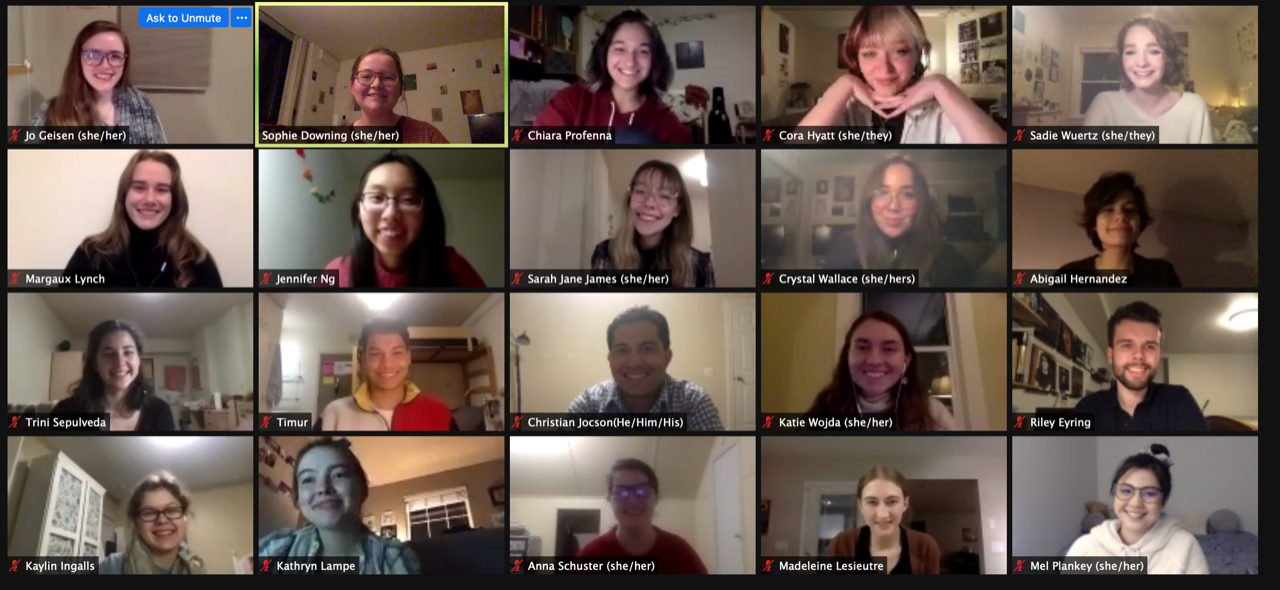
On Feb. 11, Professor John McDonald delivered his keynote speech via Zoom, to honor the 13 new members of UP’s Sigma Tau Delta Honor Society. What follows is an exploration of the self, and how we as individuals make connections and judgements—timely in this period of Zoomed everything where we have ample time to be alone with our thoughts. Please enjoy!

Websters defines the word excellence as… Just kidding.
How about the unprecedented? This word that was everywhere this past year. It seemed like everything was being described this way and actually, here we are again—in an unprecedented situation—you are being inducted in Sigma Tau Delta. Congratulations on this excellent achievement! In addition to this honor I think you should all get 2 degrees when you graduate—one from UP and one from Zoom University—or at least a certificate. You know what? Let’s make it trophies. The English department will cover that.
For several years, since the creation of STD I have sat in a chair and listened to colleague after colleague in the English department give really interesting talks at this event, and I always thought please, please don’t ever ask me, I could never come up with something this good or interesting. I have imagined the scenario of being approached and thought of how I could politely decline: no time, cat’s sick, sorry, I already know I will be sick that day, family emergency, car won’t start—you all know that grab bag of avoidances. I have been relieved each year when it wasn’t me. This year I was asked by organizers Jo and Sophie to give the keynote and honestly, I thought of why I couldn’t, and then I thought about why I had to, and eventually why I wanted to. Because students I really, really like and have relationships with asked me in a well-written paragraph full of compliments. I am not one to decline a well written paragraph.
When I was asked to give this talk, I thought, important people give keynotes, people with valuable things to say. Then I wrote that last sentence and realized, that’s not true at all. I’ve witnessed keynote or commencement speakers who were misogynist, out of touch”ist”, and a few other “ists”. I try my best not to be “ist” at all, though I am a middle-aged white guy with a lot of opinions and a definition of clever that is about 40 years old. Regardless, my goal in writing this was to say some valuable words to you, to have fun, and to hopefully interest you. I also thought, what a time, this past year, in which to give a keynote, so much possibility with the shelter in place orders, with Covid’s ever-growing infection and death rate, with our lives on hold so to speak, with our racial, political, and social tumult, socially distanced, physically distanced. So many distances. So much from which to recover, and so much to discover, potentially, about ourselves. Where to begin?
How about this poem?
The Long Up By Kay Ryan You can see the land flattening out near the top. The long up you’ve faced is going to stop. Your eyes feast on space instead of pitch as though you’d been released. The measured pace you’ve kept corrupts with fifty yards to do—fifty times as hard against the blue.
I first encountered this poem in April, 2011. I think some of us here may have read it together. My dad was to die later the same month; my mother and sisters and I had been struggling with his suffering from cancer for two relentless years. Everything about this poem felt connected to my life experience then. I needed the “long up” to stop. Or the long down, it maybe was. I was emotionally and physically exhausted and needed to get to the “blue.” It is by a poet with the exact same name as my mother. I swear that poem smashed me in the face. I now think, what was going on that I opened the New Yorker and Kay Ryan’s words, words that I needed, were there in my hands? I had never, ever, heard of her.
I connected so effortlessly and I was so excited that this connection presented itself to me. I made a copy of the poem for my mom. I thought she would see it like I did, some sort of revelation or acknowledgement from the universe of what we were going through, that our measured pace of suffering would end. There was blue up ahead. And it had her name on it. It had her name on it. She read it and was quite non-plussed, if one can be quite non-plussed. If you’ve been in any of my classes you are aware maybe, that I like to give my opinion. So I will go ahead and say that one can be quite non-plussed.
My mom did with it what she did so many times in the past, over the decades literally…that mom move: she attached it to the refrigerator with a magnet and probably never thought about it again. There it stayed, growing shabbier and shabbier, until, last time I was home, I threw it out. She didn’t have the same connection with these words, she didn’t connect her or even our experience with these words. And even here I am saying it—our connection, our experiences, not mine.
I found it. I made the connection. It wasn’t ours.
We make connections if we are fortunate. They require some investment, and do not make themselves. Nor can we necessarily make them for others.
In order for connections to have value and meaning, we have to have differences. This is something we English majors like to note as binaries, especially if it is not in an English class and we can really show off. Binaries tend to be dismissed as bad, oppressive—many people struggle due to all the binaries of various kinds. Much deserved focus is on these differences. And yet, how do we know who we want to be if we don’t know who we don’t want to be? As Joan Didion says in her essay, “Why I Write” “All I knew then was what I wasn’t, and it took me some years to discover what I was.”
I believe that we need differences to grow emotionally, to grow our curiosity (if that is a goal) and be more understanding. How many of us have read something, listened to a song, or heard someone voice an idea, etc, and thought, “This is real crap.” Emphasizing the “real”. This is different from just crap or fake crap, which can actually be good, like something being really bad in a good way. Here is an example: I was watching SNL and what do you know, Machine Gun Kelly is on and I think, well here is a musical artist that I have heard of, but have not heard. Let’s see what it’s about. And I listened and then I rendered the crap verdict mentioned above out loud to myself, (because talking more to myself out loud is something I’m doing more of during the pandemic).
Yet I do this all the time; base the value or quality of something on my standards, on my values. Or even just my interests. I’d like to think I’m a good gauge. And I am a good gauge for myself. But not for many others. It occurs to me that we are talking here about something else we English majors do. We consider ideas and experience things through lenses. Our own. We judge and we criticize.
I’m going to keep going with this judgment and criticism angle. Maybe you are like me, quick to make a judgment, or under someone else’s influence. I never read much Robert Frost because we never established a connection, he and I. Admittedly I let my connection with one of my influencers, William Carlos Williams, effect my tone against Frost; Williams’s negativity towards Frost influenced my judgment of Frost’s person and work even though I had at the time maybe read about five or so of Frost’s poems. But I ultimately read more, wanting to confirm my judgment. I did. I still think Robert Frost is dull and I hate the pseudo-corny-folksiness of his work. The only poem I ever liked is the one he stole from Shakespeare where the kid gets his hand cut by the buzzsaw and dies. Maybe Machine Gun Kelly should be reading Robert Frost.
Now, please understand, I’m not disallowing real crap. I’m just talking shit about it. My rejection will not make it go away. Or if it did, something else would take its place.
I hated Def Leppard in the 80’s when I was younger, and that was that. They came out of the New Wave of British Heavy Metal, if you are interested at all. Maybe you’ve heard your grandmother listening to them on the radio in her car. They have many recognizable hits like the song “Photograph.” Now, when Def Leppard comes on my car radio I don’t turn the station, instead I listen and I think: How is this put together? I never noticed that cowbell before. What’s behind this thing that I’m experiencing. This is not as entirely bad as I thought it was. Really, it’s not bad at all—that judgment doesn’t fit here anymore for me. I didn’t like it initially. Not that I fully embrace Def Leppard now, or even like it, but I can’t say that it’s bad anymore—I recognize the skill, the labor, the vision, and the dedication that was behind creating an album that sold 25 million copies worldwide. This doesn’t make me like the song. I will never own a Def Leppard LP-record-vinyl-album. But I will not say it isn’t worth liking.
If you haven’t been keeping score, that’s Def Leppard 1, with Frost and Machine Gun Kelly tied with nothing apiece.
Here are some final thoughts I want to end this with. We are constantly criticizing and judging, and we should be. Judgments help us make connections. Judgments help us understand one another and help deepen our relationships with others. Differences are essential. Differences are healthy. Differences are OK. Engage difference. Know where you stand. And if possible, be clear about why.
